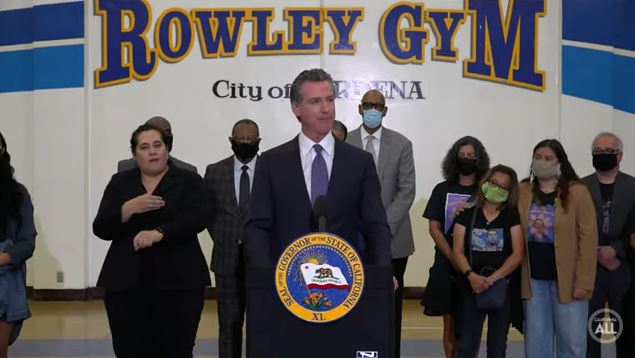In a major victory for advocates of police reform, Gov. Gavin Newsom signed on Thursday a bill that will allow the state to decertify officers who engage in serious misconduct.
Speaking at a news conference in Gardena, Newsom signed Senate Bill 2, which was authored by state Sen. Steven Bradford, D-Gardena, and which was subject to months of negotiations before the state Assembly and Senate voted to pass it on Sept. 3 and Sept. 8, respectively. Named after Kenneth Roth, Jr., a Black man who was shot and killed by a police officer, the bill ensures that California will no longer be one of just four states that do not have a decertification process for police officers (Hawaii, New Jersey and Rhode Island are the others).
Moments before he signed the bill, Newsom pointed at California's status as both a leader and a laggard when it comes to police reform, pointing to its lack of a decertification process.
"There's 46 other states that have already established foundational laws to address that issue. Why is it so hard to do the right thing? Yet it remains still hard to do the right thing," Newsom said.
The legislation creates a new advisory board that will review cases of police misconduct and issue recommendations for consideration by the Commission of Peace Officers Standards and Training (POST), the agency charged with certifying police officers. It was subject to intense negotiations after numerous police groups and lawmakers expressed concerns that the composition of the newly created advisory board does not give police officers enough representation.
Unlike the original version of the bill, the legislation that cleared the Senate on Sept. 8 no longer requires the advisory board to include two members who had been "subject to wrongful use of force" by a police officer or who are surviving family members of a person killed by the wrongful use of deadly force by an officer. Rather, it merely calls for the governor to give "strong consideration" to individuals who had been affected by police misconduct.
In addition, the revised SB 2 creates a two-thirds vote threshold for decertifying an officer and allows POST to suspend rather than decertify an officer who committed serious misconduct.
Bradford said the bill aims to target the "bad apples" in police departments and to restore trust between communities and police officers in the aftermath of incidents in which Black and brown residents have been killed in disproportionate numbers by police officers. He called Newsom's signing of SB 2 a "major victory for California" that "sends a message all across the nation."
"SB 2 will end the wash, rinse and repeat cycle of police misconduct and ensure all officers in California are held to the same fair and appropriate standard," Bradford said at the Thursday news conference.
SB 2 is part of a package of police reform bills that Newsom signed on Thursday morning. Also included in the package is AB 89, which raises the minimum age for police officers from 18 to 21 and directs the Chancellor of the California Community Colleges to create a police degree program that covers subjects such as psychology, communication and ethnic studies.
"This bill relies on years of study and new understanding of brain development, to ensure that only those officers capable of high-level decision-making and judgment in tense situations are entrusted in working in our communities," Assembly member Reggie Jones-Sawyer, D-Los Angeles, the bill's author, said at the Thursday news conference.
In addition, Newsom signed into law Assembly Bill 26, which was authored by Assembly member Chris Holden, D-Pasadena, and which strengthens laws requiring officers to intervene when they witness excessive force and prohibits retaliation against officers that report excessive force.
Joining Newsom and the lawmakers at the Gardena event were family members of individuals who were killed by police officers, including Angelo Quinto, a 30-year-old man who was killed in Antioch in December 2020 while suffering a mental health episode. His sister, Bella Collins Quinto, recalled seeing her brother feeling "very afraid and paranoid."
"The police came, and they kneeled on his neck until he was unresponsive," she recalled. "Even in the last four minutes of restraint, he was unresponsive and they didn't address that at all. It was in front of our mom — in our room. It was just absolutely excessive and unnecessary."
Newsom and Attorney General Rob Bonta both lauded the bills as a key milestone in the state's effort to improve law enforcement and restore trust between officers and the communities they serve. Bonta said the bills signed by Newsom constitute the state's response to a "crisis of trust" that the state and the nation have been experiencing when it comes to police misconduct.
"Today we witness history get signed into law," Bonta said. "And today we embark on a new chapter in which we infuse our criminal justice system with more trust, with more transparency and with more accountability."
Watch the full news conference:



Comments
Registered user
Another Mountain View Neighborhood
on Oct 1, 2021 at 5:11 pm
Registered user
on Oct 1, 2021 at 5:11 pm
I can't believe the minimum ages to drink and smoke were, until now, 3 years above the minimum age to be a cop.